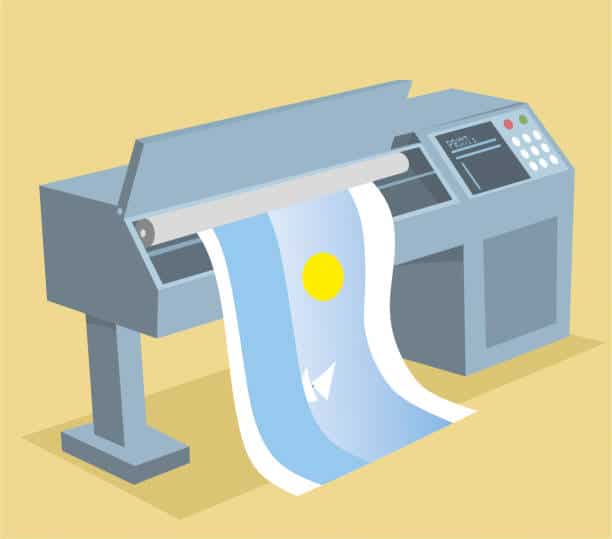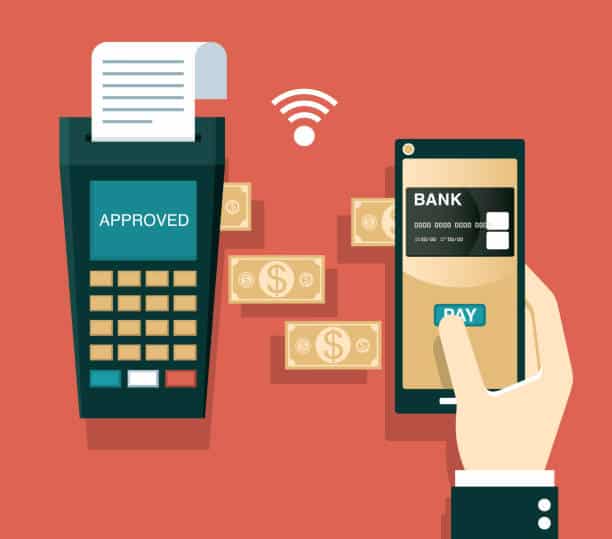In today’s digital world, you don’t need a physical shop or a warehouse to start a fashion or merchandise business. Imagine creating your own branded t-shirts, mugs, tote bags, or hoodies, without ever touching the product or worrying about delivery. That’s the beauty of print-on-demand (POD).
Many Nigerians are now discovering this low-cost, high-potential way to make money online in 2025. Whether you’re a student, graduate, stay-at-home parent, or creative artist, print-on-demand offers a fresh opportunity to build a global business right from your smartphone or laptop.
Let’s walk through this beginner-friendly guide to starting a print-on-demand business in Nigeria the right way, step by step!

Understanding Print-on-Demand (POD)
What is Print-on-Demand?
Print-on-demand is a business model where you sell custom-designed products, like t-shirts, hoodies, phone cases, or mugs, without holding any physical inventory.
When a customer places an order on your online store, the product is automatically printed and shipped to them by a POD supplier. You never touch the product!
How POD Differs from Dropshipping and Traditional Business
1. No inventory: You don’t need to buy products in bulk.
2. No shipping stress: Your POD supplier handles printing and delivery.
3. Low startup cost: You can begin with little or no money upfront.
Is Print-on-Demand Profitable in Nigeria?
Yes, it can be! The biggest advantage is that you’re selling to a global audience, especially Nigerians in the diaspora who love cultural fashion and Afrobeat merchandise.
Most POD sellers earn in dollars or euros. With good marketing and the right niche, you could make between $100 to $2,000 monthly or more.
But like every business, success takes time, testing, and consistency.
Related Posts:
- 8 Steps to Sell Online in Nigeria: 2025 Guide
- How to Start Selling on Amazon from Nigeria (2025 Guide)
Benefits of Print-on-Demand for Nigerians
Print-on-demand is ideal for Nigerians looking to start a business with little or no capital. Here’s why:
1. No Shop or Stock Needed
You don’t need to rent a shop or buy products in bulk. Everything is handled online, saving you money and space.
2. Run It from Your Phone or Laptop
Whether you’re at home or on the go, you can manage your business from a simple smartphone or computer.
3. Use Free Design Tools
Create quality designs using free tools like Canva, Kittl, and Placeit, no graphic design skills needed.
3. Sell Globally, Even While You Sleep
Your store runs 24/7. Customers from around the world can order your products anytime, and your POD supplier handles everything.
4. Earn in Dollars, Get Paid in Naira
Get paid in foreign currencies like USD or GBP and easily withdraw to your Nigerian bank account using Payoneer or Grey.

Step-by-Step Guide to Start Print-on-Demand in Nigeria
Let’s break this down clearly so you can start your POD business without confusion.
Step 1: Choose a Profitable Niche
What is a niche?
A niche is a specific group of people or interest you target, for example, people who love Afrobeat music or funny Naija slang.
Choosing the right niche helps your designs connect better and sell faster.
Examples of hot niches for Nigerians:
- Naija slang t-shirts (e.g., “Wetin Dey Sup”, “No Wahala”).
- Afrobeat-inspired fashion (Burna Boy, Davido fan merch).
- Christian quotes & faith-based tees.
- Black culture and African pride apparel.
Step 2: Create Your Product Designs
Design is the heart of your print-on-demand business. Whether you’re creating t-shirts, mugs, or phone cases, eye-catching designs are what attract buyers. The good news? You don’t need to be a professional designer to get started.
Use Free, Beginner-Friendly Design Tools
Several easy-to-use tools help you create great-looking designs without any design experience:
1. Canva: Offers drag-and-drop features with free templates. Perfect for simple and clean designs like quotes and graphics.
2. Kittl: Great for creating bold, trendy t-shirt designs. It has editable templates and a beginner-friendly interface.
3. Placeit: Allows you to upload your designs onto mockups like models wearing t-shirts or holding mugs. It makes your product look real and professional.
These tools are either free or have free versions, perfect for starting in Nigeria without spending much.
Outsource Your Designs If You Prefer
If designing isn’t your thing, you can hire someone to help. Many skilled designers offer affordable services online:
1. Fiverr: Search for “t-shirt design” or “Print-On-Demand design” and choose based on your budget.
3. Upwork: Ideal for finding long-term freelancers if you plan to scale.
4. WhatsApp Design Groups: Local communities often have talented designers willing to work at friendly rates.
Outsourcing helps you focus more on marketing and less on creating the artwork yourself.
Tips for Creating Great POD Designs
1. Keep it simple and bold: Clean designs are easier to print and often sell better.
2. Use popular quotes or trends: Things like slang, motivational phrases, or memes connect well with both local and global audiences.
3. Avoid copyright issues: Don’t use trademarked logos, names, or characters. Stick to original content to avoid getting your listings removed.
Step 3: Choose a Reliable Print-on-Demand Platform
Your print-on-demand platform is where your designs get printed, packaged, and shipped to your customers. Choosing the right one is key to running a smooth and profitable business, especially in Nigeria, where things like payment and delivery options matter a lot.
Top POD Platforms for Nigerians
Here are some trusted platforms you can start with:
1. Printify: Very beginner-friendly. It lets you choose from different suppliers and connects easily with Shopify or Etsy. And it offers high-quality products and better branding options. Delivery is faster, though pricing may be higher.
2. Teespring (now Spring): No upfront cost to start. It’s great for creators on YouTube, Instagram, or TikTok.
3. Redbubble & Zazzle: These are built-in marketplaces, meaning they already have traffic. You just upload your designs and they handle the rest.
What to Look for When Choosing a Platform
To find the one that suits you best, consider the following:
1. Product Options & Quality: Make sure the platform offers the type of products you want to sell, like shirts, hoodies, mugs, or phone cases, and that their reviews are solid.
2. Shipping & Delivery Times: Check how fast they deliver, especially to your target countries. Some suppliers have quicker delivery in the U.S. or U.K., which is great if you’re targeting buyers abroad.
3. Payment Methods: Ensure they support global payout methods like Payoneer or Wise (formerly TransferWise), so you can receive your earnings easily in Nigeria.
4. Store Integration: Confirm that the platform works well with your store, like Shopify, Etsy, or even standalone marketplaces like Redbubble.

Step 4: Set Up Your Online Store
Now that you’ve created your designs and chosen a print-on-demand platform, the next step is to set up your online store, where customers can browse and buy your products. This is your business “home” on the internet, so it needs to be clean, simple, and trustworthy.
Best Store Options for Nigerians
Here are store platforms that work well in Nigeria, whether you’re a beginner or a bit tech-savvy:
1. Shopify: Very user-friendly with drag-and-drop features. It’s perfect for beginners, but keep in mind it has a monthly fee. Great if you’re ready to build a real brand.
2. Etsy: Ideal for beginners who want to sell to a global audience. You don’t need to build a full website, just create a seller account and list your products.
3. WordPress + WooCommerce: Great for tech-savvy Nigerians. You’ll have full control over your store and lower monthly costs if you’re willing to manage it yourself.
4. Printify Pop-up Store: A free and super simple option. Just upload your designs on Printify and get a shareable store link; no need to build a full website.
Quick Tips for Branding Your Store
Your branding makes your store feel real and relatable. Here’s how to set it up nicely:
1. Choose a Unique Name: Pick a name that’s easy to remember, preferably related to your niche or style (e.g. “NaijaTrendingTees”).
2. Keep Colors & Logo Simple: Use 2-3 colors max and design a clean, simple logo using free tools like Canva.
3. Write a Friendly “About Us” Page: Share a short story about who you are, what your brand stands for, and what makes your designs special. Let people connect with the person behind the brand.
Step 5: Upload Your Products and Write Listings
Now it’s time to bring your products to life in your online store. This step involves uploading your designs onto products, writing compelling descriptions, and setting the right prices to make a profit.
How to Upload Your Products
Uploading your products is easy with the right tools:
1. Use Mockups from Printify or Placeit: These platforms allow you to see what your design looks like on real items, like a t-shirt, mug, or hoodie, before publishing. It helps customers visualize what they’re buying.
2. Apply Your Designs to Multiple Products: Start with popular items like t-shirts, mugs, tote bags, and phone cases. You can offer one design in different colors or on various products.
3. Write Product Descriptions That Convert
Your product description is your sales pitch. It should be clear, engaging, and relevant to your target audience:
4. Be Specific: Mention product details like fabric quality, available sizes, and washing instructions.
5. Connect with Culture: Add fun phrases like “Perfect for lovers of Afrobeat” or “Inspired by Nigerian street vibes.” It adds personality and helps buyers feel connected.
6. Use Keywords: Help your product get discovered in search results. Add SEO-friendly phrases like:
- “Naija slangs hoodie”
- “African culture t-shirt”
- “Made in Lagos design”
These keywords help your listings appear on Google, Etsy, and within your store’s search bar.
Set Your Prices Wisely
Your pricing should cover your costs and leave room for profit:
1. Start with the Product Cost: For example, a t-shirt on Printify might cost you $10.
2. Add Your Profit Margin: If you add $5, your selling price becomes $15. You can adjust your margin based on your brand value and customer demand.
3. Don’t Forget Other Costs: Consider platform fees, transaction charges, and possible currency conversion costs if you’re withdrawing in naira.
Step 6: Set Up Payment and Withdrawals
Getting paid is one of the most exciting parts of your print-on-demand journey, but you need the right setup to receive your money smoothly in Nigeria. Since most POD platforms pay in foreign currencies, you’ll need tools that work globally and locally.
How to Receive Money in Nigeria
Here are reliable methods Nigerians can use to collect international payments from platforms like Etsy, Shopify, Printify, and more:
1. Payoneer: One of the best and most popular options. It gives you virtual USD, GBP, and EUR accounts to receive payments. You can connect Payoneer to Shopify, Etsy, Printify, and withdraw to your Nigerian bank account in naira.
2. Domiciliary Account: A traditional bank account in USD, GBP, or EUR. Good for direct international bank transfers. You’ll need a Nigerian bank like GTBank, Zenith, or Access to open one.
3. Grey.Co, Chipper Cash, Flutterwave Store: These are modern fintech platforms that allow you to receive USD and convert it to Naira easily. They’re fast, mobile-friendly, and increasingly popular among Nigerian freelancers and online sellers.

Step 7: Market Your POD Store to Get Sales
Once your store is set up and your products are live, it’s time to spread the word and attract customers. Marketing is crucial to getting sales, and there are both free and paid methods to help you grow your brand.
Free Marketing Methods
You don’t need to spend a lot to start marketing your store. Here are some effective free strategies:
1. TikTok Videos, Instagram Reels, Facebook Posts: Create engaging short videos or posts showcasing your products in action. For example, share behind-the-scenes videos of your design process or fun clips of people wearing your items.
2. WhatsApp Business Groups & Communities: Join local or global WhatsApp groups related to your niche (fashion, lifestyle, Nigerian culture, etc.) and share your products. Just make sure not to spam, and provide value to the group.
3. Collaborate with Friends and Family: Ask your network to share your store with their contacts. Word-of-mouth is powerful, especially in local communities.
Paid Marketing Options
When you’re ready to invest in paid advertising, here are some great ways to boost your reach:
1. Facebook/Instagram Ads Targeting Nigerians Abroad (Diaspora): Ads are a powerful way to reach a global audience. Create ad campaigns targeting Nigerians living abroad (in the U.S., U.K., or Canada) who might be interested in Nigerian culture-inspired products.
2. Collaborate with Micro-Influencers: Reach out to Nigerian influencers with smaller, engaged audiences. Micro-influencers usually have better engagement rates, and you can negotiate affordable deals to promote your products.
3. Email Marketing
Email marketing helps keep your customers engaged and coming back for more. Here is some email Marketing basics:
- Collect Emails with Freebies: Offer a small freebie, like a discount on their first purchase, to get customers to sign up for your newsletter.
- Send Product Updates and Discounts: Keep your email list updated with new product launches, special promotions, and exclusive offers. Personalized emails will make your customers feel special and more likely to buy again.
Step 8: Fulfill Orders and Handle Customer Service
After you’ve marketed your store and received your first sale, it’s time to fulfill the order and provide excellent customer service. This step is crucial for keeping your customers happy and encouraging repeat business.
Order Fulfillment
The beauty of print-on-demand is that the hard work of printing and shipping is handled for you. Here’s how it works:
1. Automated Fulfillment: Once a customer places an order and pays for it, your print-on-demand supplier takes care of the rest. They print the item with your design and ship it directly to your customer.
2. No Inventory Management: You don’t need to worry about storing products or packing orders. Your POD platform handles it all, freeing up your time to focus on growing your store.
Customer Service Tips
Great customer service helps build loyalty and trust with your customers. Here’s how to handle it well:
1. Respond quickly and politely: Always respond to customer inquiries as soon as possible. A fast response shows you care about your customers. Be polite and helpful in all your communications.
2. Use Tracking Numbers: When the order is shipped, share the tracking number with your customer. This helps them stay updated on their order’s journey and reduces the chances of confusion.
3. Handle Complaints Gracefully: If a customer isn’t happy with their product, handle their complaint professionally. Offer solutions like refunds, exchanges, or discounts. Handling complaints well can turn a dissatisfied customer into a loyal one.
Step 9: Scale and Grow Your Business
Once your print-on-demand store is up and running smoothly, it’s time to focus on scaling and growing your business. This involves analyzing your performance, expanding your product range, and exploring new opportunities to reach more customers.
Analyze and Improve
Understanding what’s working and what’s not is crucial to growing your business:
1. Use Analytics Tools: Platforms like Etsy and Shopify provide analytics that show you which products are doing best. Track your sales, customer behavior, and traffic sources to see what’s driving success.
2. Optimize Your Designs: Take note of which designs attract the most attention or sales. If a specific design is performing well, consider making variations of it or promoting it more.
Expand
Growing your product range and exploring new markets will help you scale:
1. Create More Designs Weekly: Consistently adding fresh designs keeps your store exciting and encourages repeat customers. Aim to release new products regularly to stay relevant and competitive.
2. Add New Products: Don’t limit yourself to just t-shirts or mugs. Consider expanding into other items like phone cases, notebooks, hoodies, and tote bags. The more variety you offer, the more potential sales you can make.
3. Open New Stores or Join Other Platforms: If you’re successful on one platform, why not expand? Consider opening a new store on platforms like Redbubble, Teespring, and Zazzle, cross-promoting your existing store on Etsy and Shopify to increase visibility.

Challenges Nigerians Face and How to Overcome Them
Running a print-on-demand business as a Nigerian can come with its own set of challenges. Fortunately, most of these challenges have practical solutions. Let’s look at some common obstacles and how you can overcome them.
1. Internet Issues: Design offline and upload when you’re back online. Sometimes internet connectivity can be unreliable, but you can always work on designs offline and upload them when you’re able to connect. This ensures you stay productive without getting stuck.
2. Dollar Payment Issues: Use verified Payoneer and Grey accounts for hassle-free international payments. Both of these options allow you to receive foreign currency and easily withdraw to your local bank account in naira. Ensure your accounts are properly set up to avoid payment delays.
3. Shipping Delays: Use reliable POD partners and be transparent about delivery times. Shipping delays can happen, especially when dealing with international orders.
Partner with trusted POD platforms that offer reliable and timely delivery. Always be honest with customers about estimated shipping times, so they know what to expect with their order.
By addressing these common challenges, you can continue running your print-on-demand business smoothly. Being proactive in finding solutions will help you stay on track and keep your customers satisfied.
Legal and Business Considerations in Nigeria
When starting and scaling your print-on-demand business in Nigeria, there are several legal and business steps to consider to ensure your business operates smoothly and is protected.
Register Your Business Name with CAC (Optional but Helpful)
While not mandatory for everyone, registering your business with the Corporate Affairs Commission (CAC) in Nigeria can offer multiple benefits.
This process makes your business officially recognized and gives you legal standing. It also helps establish credibility and trust with potential customers.
Why Register? It makes it easier to open a business bank account, apply for business loans, and protect your brand.
How to Register: Visit the CAC website, choose your preferred business name, and submit the required documents.
Get a TIN (Tax Identification Number) if Scaling Up
A Tax Identification Number (TIN) is needed if you’re growing your business. It ensures you comply with Nigerian tax laws.
Why TIN?: Necessary for taxes and corporate accounts.
How to Get a TIN: Apply via the FIRS website or at your local tax office.
Trademark Your Brand Name and Unique Logo
Trademarking protects your brand and prevents others from using your name or logo.
Why Trademark?: Secure your intellectual property.
How to Trademark: Apply through the Nigerian Intellectual Property Office (NIPO).
Taking these legal steps will not only protect your business but also set you up for long-term success as you grow your print-on-demand business in Nigeria.
Frequently Asked Questions and Answers
1. Is the Print-on-Demand Business Profitable?
Yes, print-on-demand can be highly profitable if you focus on creating high-quality designs, choose the right niche, and market your products effectively. Since you don’t have to handle inventory or shipping, your initial costs are low, allowing for a potentially high profit margin. However, like any business, success depends on your strategy, consistency, and ability to attract customers.
2. Can I Make a Living with Print-on-Demand?
Yes, it is possible to make a living from a print-on-demand business, especially if you dedicate time to learning the ropes and scaling your business. Many successful entrepreneurs earn a full-time income by focusing on niche markets, building a strong brand, and running multiple stores. But it takes time to build momentum, so expect to invest time and effort before you start seeing substantial income.
3. How Long Does It Take to Make Money with Print-on-Demand?
Making money with print-on-demand varies from person to person. Typically, it can take anywhere from a few weeks to several months to make your first sale, depending on your marketing efforts and product appeal. It takes longer to build a steady income, so patience and consistent effort are key. Successful stores usually start seeing stable earnings within 3 to 6 months, but some may take longer.
4. Which POD platform is best for Nigerians?
Here are the preferred ones: Printify + Etsy combo works well, and you can get paid via Payoneer.
Conclusion
Starting your print-on-demand business in Nigeria might initially feel overwhelming, but remember, every successful POD seller was once a beginner like you. The most important step is the first one. Start small, stay consistent, and keep learning as you grow.
You don’t need to be a tech genius or a fashion designer to succeed. All you need is a good idea, a creative spirit, and the willingness to take action.
So go ahead, create your first design, choose your niche, and launch that store.


